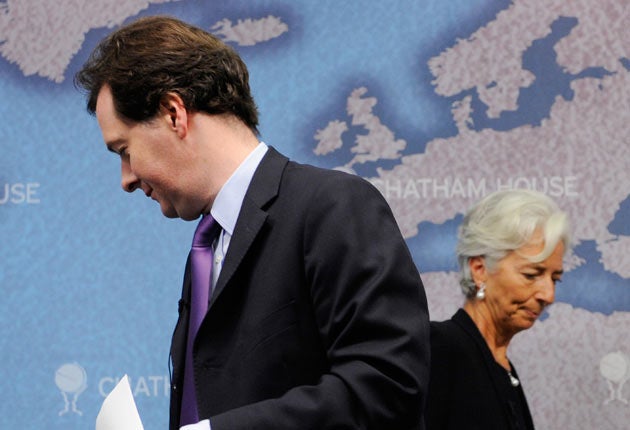After an incredibly volatile day on world markets, the Chancellor, George Osborne, warned his European counterparts that they had six weeks to agree on radical measures to address the eurozone sovereign debt crisis before the next G20 meeting in November.
Mr Osborne, who is in Washington for the International Monetary Fund summit, said European finance ministers are finally waking up to the fact that they must act faster to resolve the Continental debt crisis. He added that the "leading lights of the eurozone are aware of the fact that time [is] running out for them".
The warning followed the failure of the G20 to convince investors that they would avert a new global banking crisis. A communiqué from G20 finance ministers and central bank governors pledging to "take all necessary action to preserve the stability of banking systems and financial markets" failed to deliver a significant lift to investor sentiment.
The G20 communiqué said: "We will ensure that banks are adequately capitalised and have sufficient access to funding to deal with current risks". But no new plan to inject capital into the Continent's fragile financial sector was announced. The IMF claimed this week that there is a potential €200bn hole in the balance sheets of European banks as a consequence of strains in the sovereign debt market.
A move by the credit rating agency Moody's to further downgrade eight Greek banks underlined the stresses in the Continent's financial sector.
The head of the IMF, Christine Lagarde, warned yesterday of a looming "collapse in global demand" which threatens to push economies around the world into a new recession.
"Dark clouds over Europe and huge uncertainty in the United States" mean that "the challenge could not be more urgent", she told politicians and leading economists at the summit in Washington.
Calling for immediate action to support global growth and stabilise the international financial sector, Ms Lagarde said: "The actions I am calling for today are not for the coming years – they are for the coming months."
If the euro were to collapse, British banks would register large losses on those loans. Despite rising fears about the health of European banks, Mr Osborne yesterday insisted that British banks are perfectly safe.
Q&A
The stock market rose yesterday. Are the problems over?
If only. The stock market is a poor guide to the health of the world economy at the best of times. Lots of other markets were still in freefall – many commodities plunged and credit market indicators are flashing an ever more scarlet shade.
What's the biggest problem at the moment?
The marked slowdown in the pace of the global recovery. It's the same across almost all industrialised nations, including the US, the world's largest economy, where unemployment remains close to 10 per cent and the disastrous housing market is damaging people's confidence. Governments are also under huge pressure to reduce their debts, which limits what they can do to promote growth. But how much can we cut by without tipping back into recession?
Where do the banks fit into this?
Their primary worry is the eurozone sovereign debt crisis. Greece owes so much money, the markets don't believe it can pay it all back. Much of the money is owed to European banks, which would be seriously damaged if Greece were to default.
How will events play out if it reaches crisis point?
The financial system could go into lockdown – no one knows how badly anyone is damaged, so everyone pulls in their horns. Banks stop lending and may eventualluy find it difficult to fund operations – like filling up cash machines.
Subscribe to Independent Premium to bookmark this article
Want to bookmark your favourite articles and stories to read or reference later? Start your Independent Premium subscription today.


Join our commenting forum
Join thought-provoking conversations, follow other Independent readers and see their replies